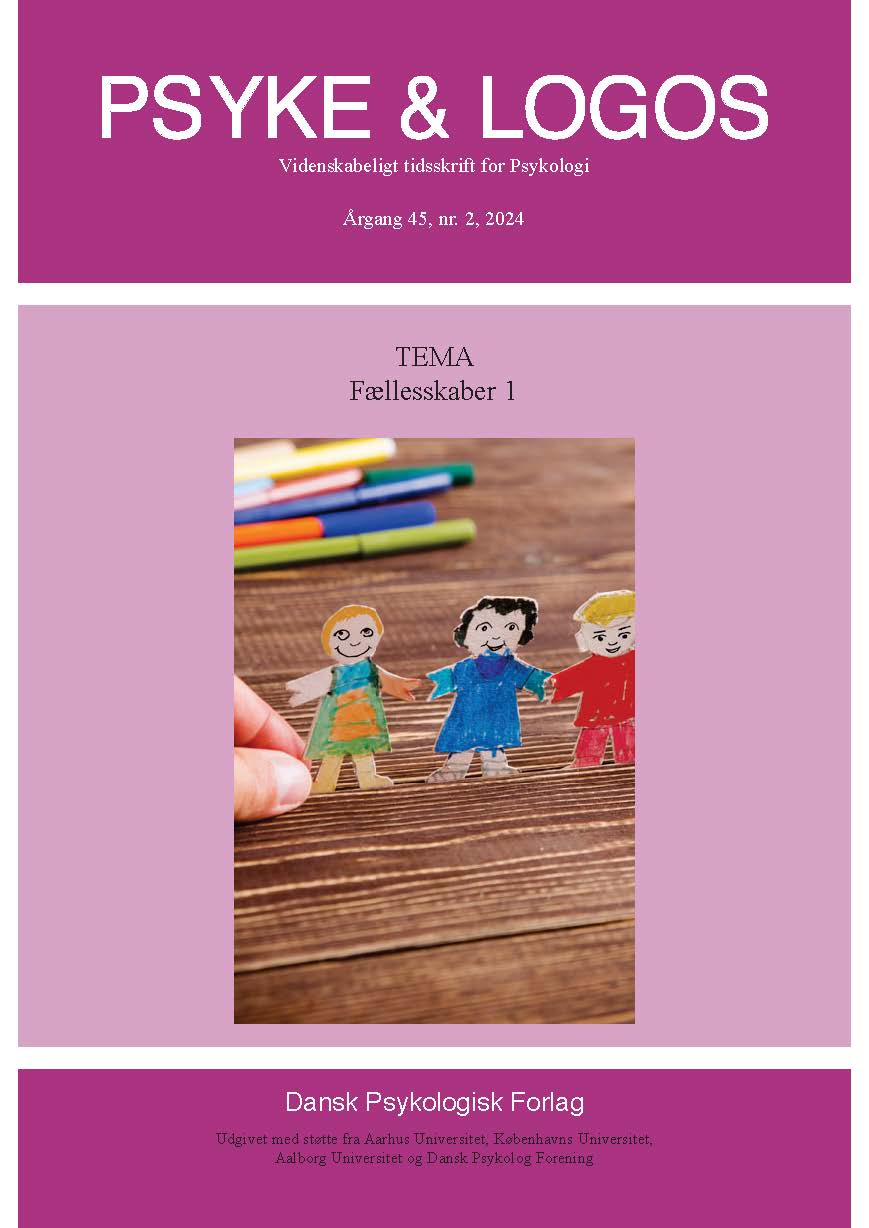Social research in support of democratic communities through ‘future workshops’
DOI:
https://doi.org/10.7146/pl.v45i2.152013Keywords:
Deliberative democracy, communities, epistemic injustice, practice research, future workshopsAbstract
The purpose of this article is to develop and refine methodological principles for democratic community-supportive research based on a specific research project about families in vulnerable positions. First, we present an ideal for a democratic community and a participatory approach to research aimed at enhancing such communities, along with a set of methodological principles that such research should follow. We emphasise political equality, democratic control, and the derived need to minimise the risk of epistemic injustice towards citizens in marginalised positions. Subsequently, we examine the methodological potential of future workshops in illuminating marginalised perspectives. We conclude that good intentions regarding the inclusion of marginalised perspectives in research are insufficient in themselves to realise a form of research that serves democratic communities, and to do so requires that the methodological principles need to be situated and negotiated with the participants involved.
References
Abizadeh, A. (2023). The grammar of social power: power-to, power-with, power-despite and power-over. Political Studies, 71(1), 3-19. https://doi.org/10.1177/0032321721996941
Andersen, M.L., Brandt, L.I., Henriksen, K., Mejlvig, K., Nirmalarajan, L., Rømer, M., Uggerhøj, L. & Wisti, P. (2020). Underlying theoretical positions, perceptions, and foundations in practice research. I: L. Joubert & M. Webber (red.), The Routledge Handbook of Social Work Practice Research (s. 57-68). Routledge.
Anderson, E.S. (1999). What is the point of equality? Ethics, 109(2), 287-337. https://doi.org/10.1086/233897
Anderson, E. (2010). The Imperative of Integration. Princeton University Press.
Anderson, E. (2012). Epistemic justice as a virtue of social institutions. Social Epistemology, 26(2), 163-173. https://doi.org/10.1080/02691728.2011.652211
Askheim, O.P. & Borg, M. (2010). Deltagerbasert forskning i psykisk helsearbeid: Et bidrag til mer “brukbar” kunnskap? Tidsskrift for psykisk helsearbeid, 7(2), 100-109. https://doi.org/10.18261/ISSN1504-3010-2010-02-02
Beebeejaun, Y., Durose, C., Rees, J., Richardson, J. & Richardson, L. (2013). Beyond text: exploring ethos and method in co-producing research with communities. Community Development Journal, 49(1), 37–53. https://doi.org/10.1093/cdj/bst008
Bächtiger, A., Dryzek, J.S., Mansbridge, J. & Warren, M. (2018). Deliberative democracy: an introduction. I: A. Bächtiger, J.S. Dryzek, J. Mansbridge & M. Warren (red.), The Oxford Handbook of Deliberative Democracy (s. 1-32). Oxford University Press. https://doi.org/10.1093/OXFORDHB/9780198747369.013.50
Benhabib, S. (2013). Reason-giving and rights-bearing: constructing the subject of rights. Constellations, 20(1), 38-50.
Cohen, J. (2009). Philosophy, Politics, Democracy. Harvard University Press.
Duffy, J. & Beresford, P. (2020). Critical issues in the development of service user involvement. I: H. McLaughlin, P. Beresford, C. Cameron, H. Casey & J. Duffy (red.), The Routledge Handbook of Service User Involvement in Human Services Research and Education (s. 9-16). Routledge.
Dumbrill, G.C. (2006). Parental experience of child protection intervention: A qualitative study. Child Abuse & Neglect, 30(1), 27-37. https://doi.org/10.1016/j.chiabu.2005.08.012
Epstein, I., Fisher, M., Julkunen, I., Uggerhoj, L., Austin, M.J. & Sim, T. (2015). The New York statement on the evolving definition of practice research designed for continuing dialogue: a bulletin from the 3rd international conference on practice research (2014). Research on Social Work Practice, 25(6), 711-714.
Forst, R. (2017). Normativity and Power: Analyzing Social Orders of Justification. Oxford University Press.
Fricker, M. (2007). Epistemic Injustice: Power & the Ethics of Knowing. Oxford University Press.
Gutmann, A. & Thompson, D. (2004). Why Deliberative Democracy? Princeton University Press.
Habermas, J. (1996). Between Facts and Norms. Polity Press.
Joubert, L. & Webber, M. (2020). New frontiers for practice research. I: L. Joubert & M. Webber (red.), The Routledge Handbook of Social Work Practice Research (s. 49-495). Routledge.
Jungk, R. & Müllert, N.R. (1984). Håndbog i fremtidsværksteder. Politisk Revy.
Lafont, C. (2020). Democracy Without Shortcuts: A Participatory Conception of Deliberative Democracy. Oxford University Press.
Müller, M., Nirmalarajan, L.Y., Wisti, P. & Uggerhøj, L. (2023). Co-production between researchers, service users, and practitioners in practice research – barriers and possibilities. Asia Pacific Journal of Social Work and Development, (ahead-of-print) 1-16. https://doi.org/10.1080/02185385.2023.2233490
Nirmalarajan, L.Y. (2023). Mellem nærhed og distance i participatorisk praksisforskning: metodologiske refleksioner over fælles vidensproduktion med brugere. Forskning i Pædagogers Profession og Uddannelse, 7(2), 4-12. http://doi.org/10.7146/fppu.v7i2.141834
Rostbøll, C.F. (2023). Democratic Respect: Populism, Resentment, and the Struggle for Recognition. Cambridge University Press.
Sim, T., Austin, M., Abdullah, F., Chan, T.M.S., Chok, M., Ke, C., Epstein, I., Fisher, M., Joubert, L., Julkunen, I., Ow, R., Uggerhøj, L., Wang, S., Webber, M., Wong, K. & Yliruka, L. (2019). The Hong Kong statement on practice research 2017: contexts and challenges of the far east. Research on Social Work Practice, 29(1), 3-9. https://doi.org/10.1177/1049731518779440
Smith, L., Bratini, L., Chambers, D.A., Jensen, R.V. & Romero, L. (2010). Between idealism and reality: meeting the challenges of participatory action research. Action Research, 8(4), 407-425.
Taylor, M.F.; Pooley, J.A. & Carragher, G. (2016). A systematic review of current data collection techniques used to enhance involvement of “hard to reach” adolescents in research studies. I: K. Bhopal & R. Deuchar (red.), Researching Marginalized Groups (s.149-166). Routledge.
Uggerhøj, L., Henriksen, K. & Andersen, M.L. (2018). Participatory practice research and action research: birds of a feather? China Journal of Social Work, 11(2), 186-201. https://doi.org/10.1080/17525098.2018.1537086
Uggerhøj, L. & Wisti, P. (2020). Social work practice research developments: four statements and ten years later. I: L. Joubert & M. Webber (red.), The Routledge Handbook of Social Work Practice Research (s. 32-42). Routledge.
Young, I.M. (2000). Inclusion and Democracy. Oxford University Press.
Downloads
Published
How to Cite
Issue
Section
License
Ophavsret er tidsskriftets og forfatternes. Det er gældende praksis, at artikler publiceret i Psyke & Logos, som efterfølgende oversættes til andet sprog, af forfatteren frit kan publiceres i internationale tidsskrifter, dog således at det ved reference fremgår, at den oversatte artikel har et forlæg i en dansksproget version i Psyke & Logos. Artikler kan frit deles og linkes til på forsknings- og undervisningsnetværk (så som Blackboard). Link foretrækkes, fordi det giver oplysning om brug af tidsskriftets artikler.




